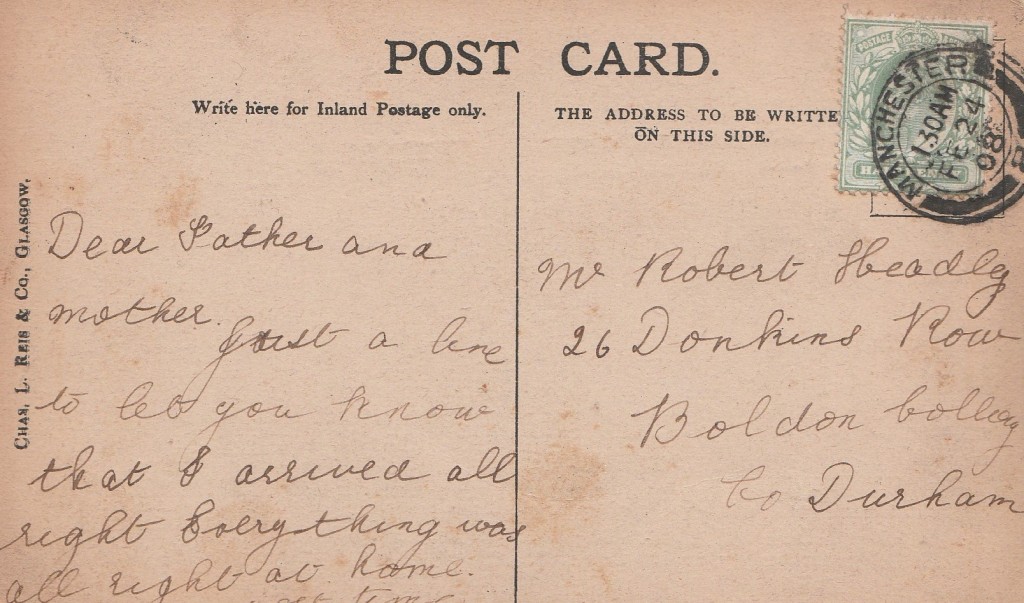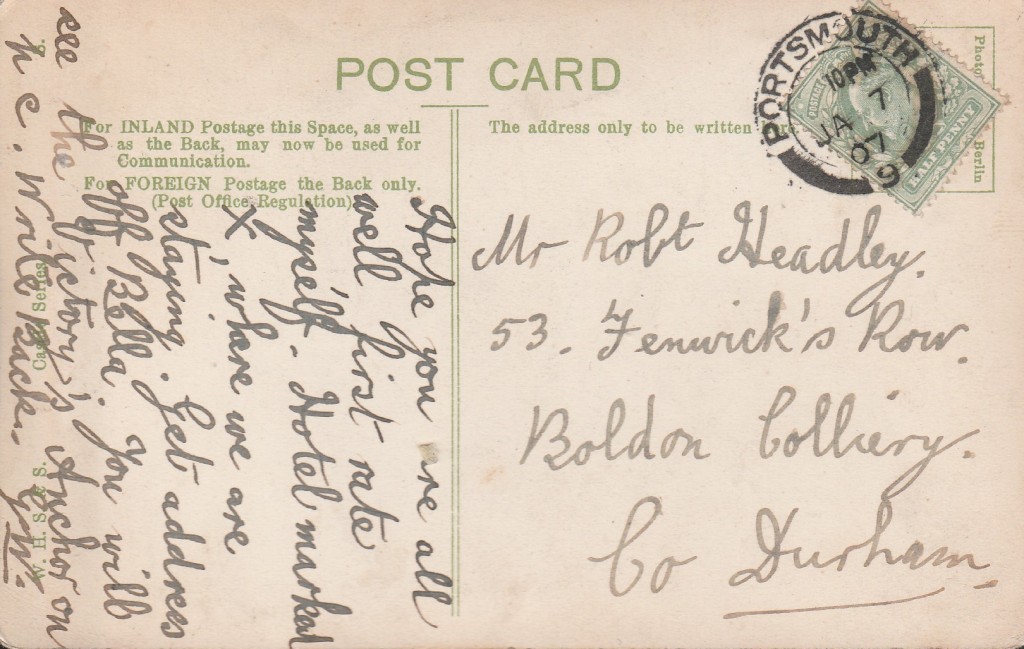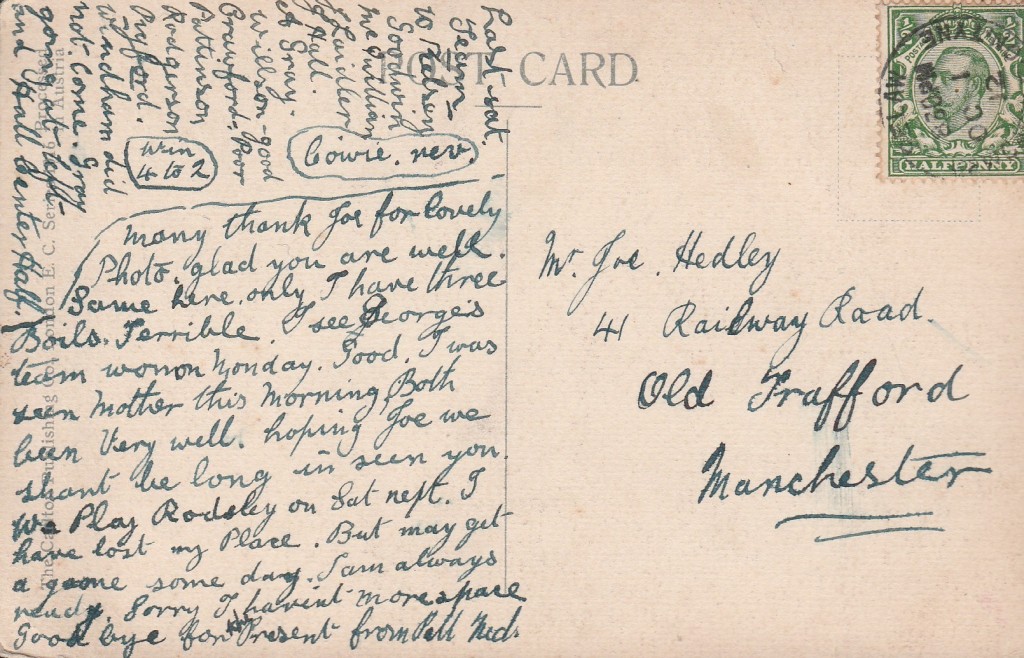Ask any football fan to name a Manchester United left-winger, and 99% of them will say Ryan Giggs – and why not? He is, after all, the most decorated British player of all time. But go back a century before Giggs, to the early 1900s, and you will find a man by the name of George Wall patrolling the left flank for the Red Devils. Though his name may not be well known now, at the time, he was something of a star.
The diminutive winger, from a small coal-mining town in County Durham, would enthral crowds during the early days of Manchester United. With his tricky wing play and bullet shot, he made a reputation for himself as one of the best Outside Lefts in the country. He played in a team that delivered United’s first period of success, including two league championships and an FA Cup.
Although he died nearly sixty years ago, his family retained a quite unique record of his career, in the form of postcards sent by George, his wife Bella, and brother Tommy. These seemingly innocuous bits of card provide a fascinating snapshot of life at the time, and illustrates just how different communication was for those living in the early days of the 20th century.
Before the War
George Wall was born in February 1885 in the mining village of Boldon Colliery, County Durham. Growing up, George showed a talent for football and would play for local sides Boldon Royal Rovers, Witburn and Jarrow, before being signed by Barnsley.
George would go on to make 80 appearances for the Tykes over the next three years, scoring 25 times. He then came to the attention of Manchester United, at that time still a Second Division club, and he joined them for £175 in April 1906.
Wall would score the winner on his debut, a 1-0 victory against Clapton Orient, contributing a further two goals in the final six games to help United to a second-place finish and promotion to the First Division.
In their first season after promotion (1906/07), United finished a respectable eighth. Playing alongside a legend of the time, Billy Meredith, George would score 11 league goals, including a hat trick against The Wednesday in a 5-0 victory. Meredith was a rare breed, having played for both the red and blue halves of Manchester, and United manager at the time, Ernest Mangall, remains the only man ever to manage both clubs.
The following season (1907/08), United would win their first league title, finishing an impressive nine points clear of second-placed Aston Villa. George would contribute a mightily impressive 18 league goals, adding a further three in the FA Cup, where United was eliminated in the fourth round. George’s League Winners’ medal can be found on display, along with other items of memorabilia at the Manchester United museum at Old Trafford.
There was also a historic occasion at the end of this season when the first Charity Shield took place. Unlike today’s format, the Charity Shield was originally contested by the winners of the Football League and the winners of the Southern League. The first game was played at Stamford Bridge, in poor conditions and in front of just 6000 fans, and ended in a 1-1 draw. Initially, it was thought that the honours would be shared, but a replay was organised for late August, United this time running out 4-0 winners in front of a crowd of 50,000. Over the two games, more than £1000 was raised for charities. George would contribute the third goal in this game.

United would fail to defend their title in the 1908/09 season, finishing a disappointing 13th. However, it was not all disappointment as United would win the FA Cup with a 1-0 triumph over Bristol City. George would also suffer something of a dip in form over the season, though he still managed to hit double figures, contributing 11 league goals.
The 1909/10 season would herald a new beginning for United as, in February 1910, the club moved from its Bank Street ground to a new stadium in Old Trafford. The first game at their new home was a 4-3 defeat against Liverpool, in which George scored the third United goal. Overall, it was an unspectacular season for United as they finished fourth and were knocked out of the FA Cup in the first round. George finished as the club’s top scorer with 14 goals.
The 1910/11 season would see United win a second title. It was, however, a quiet season for George as he scored just five times in 26 league games, also contributing one in the FA Cup. During this season, United signed centre forward Enoch West from Nottingham Forest. The striker scored 80 goals in 181 games. Infamously, West was banned for life for his part in a match-fixing scandal in 1915, with his ban only being lifted in 1945 when West was 59.
As with United’s last title win, the following season (1911/12) was a disappointing one as the club finished 13th. George only managed to score just three league goals. However, he did find the back of the net in a quite remarkable Charity Shield match. In the same game, his teammate Harold Halse scored a staggering six times as United took an 8-4 win against Swindon.
The 1912/13 season would see a slight improvement in the fortunes for both player and club, as George managed to hit double figures for league goals and United secured a fourth-place finish.
The 1913/14 season would prove to be a disappointment for United as they finished a lowly 14th. George would end the season with 11 league goals, four behind top scorer George Anderson. United was also eliminated from the FA Cup in the first round without troubling the scoreboard.
In the last season before the stoppage for the war, United narrowly escaped relegation, winning just nine of their 38 games. George only managed to contribute just two goals, scoring what would turn out to be the last of his United career in a 4-2 loss to Everton in October 1914.
International Football
George represented England on seven occasions, scoring twice. His two goals came in a 2-0 win against Scotland as part of the Home International Championship on April 3rd 1909.
As with the England teams of today, the press were rarely shy of criticising their efforts. The following was a statement released and signed by the whole squad prior to this game:
“We, the members of the English International team, desire to declare that, notwithstanding what has appeared in the Press, there was never the slightest doubt as to our determination to play our hardest and do our best to accomplish a victory for England against Scotland, and we consider any suggestion to the contrary an insult to us individually and as a team.”
The press was, of course, a little more forgiving when results went the right way. This is an excerpt from a report in the Times on April 5th:
The 38th contest between England and Scotland, played on the Crystal Palace ground on Saturday, produced one of the best international games of recent years. At times the play reached a very high standard, and there was nothing in the shape of rough or foul play to mar what proved to be a most enjoyable game to watch. During the 90 minutes there was only one brief stoppage for an injury to a player. England gained a well-deserved victory by two goals to none, and earned the distinction of being the first country to win the three international games without the loss of a goal.
The weather was fine and the attendance numbered about 35,000. The Prince of Wales was present, and met with a most enthusiastic reception on entering and leaving the pavilion. He was received by Lord Kinnaird, the president of the Football Association…
Three minutes from the start a centre by Pentland compelled the Scotch defence to concede a corner-kick. The ball came out to Wall and his shot struck one of the backs. It rebounded to the same player, who promptly shot into the net from about 18 yards range…
…15 minutes from the start a brilliant individual effort by Wall resulted in a second goal. The player got the ball in midfield, eluded McNair and Cameron, and, running right into goal, scored with a magnificent shot that Brownlie had no chance of saving…
The referee awarded a penalty kick to Scotland for what appeared to be accidental handling by Pennington, but Stark made a poor attempt to score, and Hardy easily cleared…
The winners were the superior team both in attack and defence. The elaborate short passing tactics adopted by the Scottish forwards compared unfavourably with the dashing individual runs and long passing methods of the winners.
The First World War
Football ceased after the 1914/15 season, and George, like many of his teammates, enlisted, joining the Black Watch in July 1915. He would rise to the rank of Sergeant but would never see front line action. Instead, he operated as a PT Instructor.
George would see some football action during the war, playing in a locally arranged league for Scottish outfit, Cowdenbeath. The Blue Brazil would win the Eastern League, and George would be inducted into the Cowdenbeath FC Hall of Fame for his exploits.
George would also be the subject of some British war propaganda. In the piece, which featured in the Evening Telegraph & Post in July 1915, George is described as “not the most robust of footballers” and that his signing up “set a good example for the single players”.
George’s brother, Tommy, who played for United’s reserve team, also enlisted and would see action with the Yorkshire Regiment and the 2/10th Battalion of the Manchester Regiment. Tommy was killed in action on October 9th 1917. His body was never formally identified, and he is commemorated, along with more than 34,000 others on the Memorial to the Missing at Tyne Cot Cemetery, the biggest of the British War Cemeteries. It contains the graves of around 12,000 men, of whom more than three quarters are unnamed.
After the War
Once the war was over, George moved on to Oldham Athletic, where he played a total of 74 games, scoring 12 goals. He followed this up with a return to Scotland to play a season with Hamilton Academicals. His last season in professional football would be with Rochdale in the 1922/23 season, scoring once in 31 games.
Later Life
After leaving professional football, George continued playing at the amateur level with Ashton National and Manchester Ship Canal. He would also take up working for the Ship Canal Company.
He maintained his fitness in later life by taking daily walks and keeping active. He passed away in June 1962 at the age of 77.
















A brilliant piece of writing by my grandson Adam, about my grandad George Wall. Makes me so proud of Adam researching his family.
LikeLike